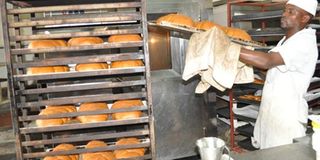Supermarkets kicking local bakeries out of business

A man prepares bread ready for packaging. Photo by Rachel Mabala
Kampala- Most modern supermarkets come with an in-house bakery where they make bread, cakes and other foods. As a result, many shoppers have been attracted to these bakeries because they offer fresh bakes.
But small bakeries are increasingly becoming jittery about this development in Kampala, claiming supermarkets are eating up on their customers.
They say sometimes supermarkets reject their bread supplies. Although local bread still makes it to the stalls of many big supermarkets, it is mainly produced by bigger local bakeries.
In Nakumatt Supermarket yesterday, there were three types of bread - Dada and Everyday, as well as Breadbasket bread that is baked by the supermarket.
John Male, a baker in Natete, a Kampala suburb, says the business “is dying” in an area that has been a baking hub to small and bigger bakeries for many years.
He says several small bakeries have closed shop in recent years because they could not cope with the stiff competition, adding that supermarkets, most of which are owned by non-Ugandans, are “kicking Ugandans out of business”.
The baker argues that baking is a relatively easy business which should be exclusively left to Ugandans.
“These supermarkets came here to retail not to make bread. It is wrong for them to be allowed to encroach on businesses which Ugandans can do,” Male says.
He appeals to the government to offer local bakers, especially the smaller ones, more support and protection.
However, bigger bakers, including Gasta Lule, the proprietor of Ntake Bakery and chairperson of the Uganda Bakers Association, thinks otherwise.
Lule says supermarkets have a right to accept what they want to sell and reject what they do not want.
“Companies are licensed to carry out their primary businesses but they can also engage in other businesses,” Lule says, adding: “I am sure that apart from having a trading licence, each supermarket that has a bakery has a baking licence too.”
Amos Nzei, the owner of Hot Loaf Bakery, says competition is a basic prerequisite to doing business and that he is not bothered by supermarket bakeries.
“I don’t think they make better bread than us, so we really have no problem with them baking their own bread,” Nzei says.
‘Up your game’
He says supermarkets aim at providing one-stop shopping centre hence the need for them to make their own bread.
“It is up to the local bread producers to step up and compete.”
Nzei’s bakery has its own outlets in different locations and it may not need to vend its products in supermarkets. But this is not true with all the other local producers.
According to Male, more Ugandans are shopping from big supermarkets but Lule says small bakeries should produce bread of high quality.
He says there have been complaints of small bakers putting products of the wrong weights on the market and selling them at a cheaper price than other producers.
“This can only be solved by the bakers taking steps to become more efficient and eventually be competitive,” Lule says.
Diversification call
Lule advises bakeries to diversify their businesses, adding that while he started out as a baker, he now also has interests in milling and water.
But not all bakers will necessarily diversify their businesses. Male says his market within Kampala has been diminishing in recent months, the reason he has now turned his attention to the rural areas.
In the rural areas, he says, they sell bans and they have to learn to compete with the small bakeries in those localities that have served them for many years.
If his new strategy fails, Male says he will have no option but to drop out of the bakery business.
But whatever happens, he insists that government should designate fields in which foreigners can engage and ring fence others for Ugandans.
THE PRICE AND TYPES OF BREAD
Shs4,400: The price of a kilo of Breadbasket bread baked by Nakumatt Supermarket.
Shs4,500:The price of a kilo of Ntake bread sold at a retail shop in Kamwokya, a Kampala suburb.
Shs4,200:The price of a kilo of Everyday bread sold at the supermarket.
Shs4,500:The price of a kilo of Family Bread sold at the retail shop.
Shs3,900:The price of a kilo of Dada bread sold in the supermarket.
Shs4,400: The price of a kilo of Everyday bread at the retail shop.
BREAD MAKING IN UGANDA
Producers: There are about 15 major producers of bread under their association, Uganda Bakers Association.
Materials: They use 80 per cent of the wheat in bread making. Between 80,000 to 100,000 tonnes of flour go into making bread monthly.
Sale: The industry mainly sells on the local market, little is exported to Southern Sudan and Kenya.




